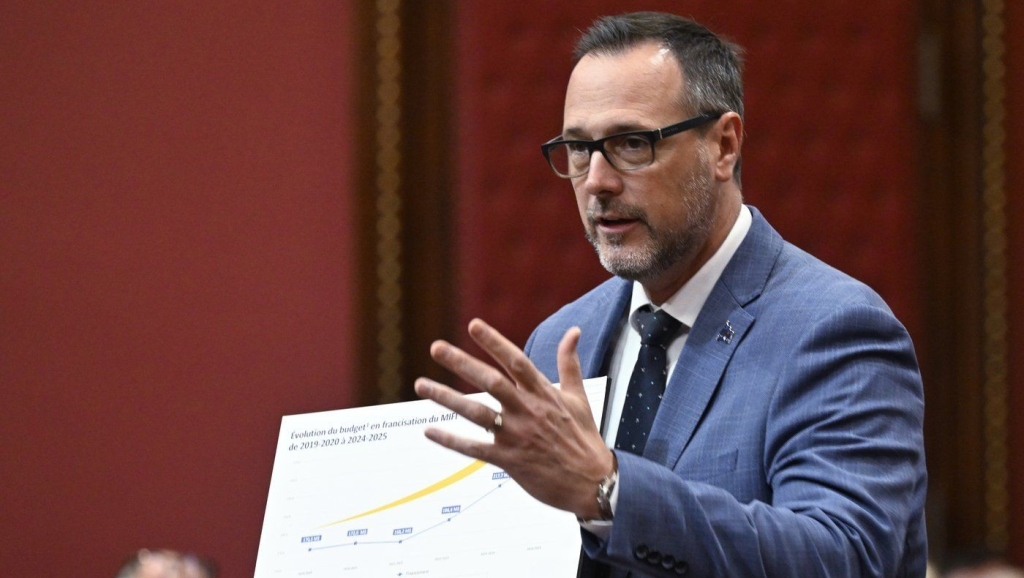Quebec freezes two major immigration streams that provide path to permanent residency

Posted October 31, 2024 10:26 am.
Last Updated October 31, 2024 5:26 pm.
The Quebec government has frozen two major immigration streams that provide a pathway to permanent residency, after complaining for years that the number of newcomers settling in the province is threatening its language and culture.
The moratorium, however, comes on the same day the provincial government announced it planned to welcome up to 67,000 immigrants in 2025 — several thousand more than in 2023 and than what was planned for 2024.
Speaking to reporters at the legislature on Thursday, Immigration Minister Jean-François Roberge said that effective immediately the province has suspended applications for the Quebec Experience Program, a path for permanent residency for foreign students who graduate in the province. As well, the government has stopped accepting applicants from the Regular Skilled Worker Program.
These two programs comprise the majority of Quebec’s economic immigrants, the selection for whom is controlled by the provincial government. The other major streams — family reunification and the refugee program — are largely controlled by the federal government.
The freeze will remain until June 2025 at the latest, the time it will take for the province to come up with its immigration plan for 2026, Roberge said. Calling the government’s moratorium “courageous,” Roberge said pausing the programs will allow the province to gain more control over immigration.
In 2022, Premier François Legault said it would be “suicidal” for the province to accept more than 50,000 immigrants per year, because of the threat they pose to the survival of the French language. But Roberge’s immigration plan, tabled Thursday, projects the province will welcome up to 67,000 in 2025. There were around 52,800 immigrants in 2023 and the province plans to welcome up to 61,450 in 2024.
#WATCH: The CAQ is freezing two programs that allows people to obtain permanent residence: the Regular Skilled Worker Program (RSWP) and the Quebec Experience Program (PEQ) in the graduate component.
— CityNews Montreal (@CityNewsMTL) October 31, 2024
READ: https://t.co/19aWoNli0J pic.twitter.com/BaTtVF2q1T
Despite the rise in newcomers projected for 2025, Roberge says a higher percentage of them will speak French than in past years.
“2025 will be an exceptional year in the sense that for the first time, the proportion of immigrants who know French will be around 80 per cent,” he told reporters.
And because they will know French, Roberge said, welcoming up to 67,000 people won’t be as threatening to Quebec’s language and culture. “When we change our analysis and increase the number of French-speaking people graduating in Quebec and integrating into Quebec, I think we can adjust our governance without in any way reneging on what was said.”
In August, Quebec announced a six-month freeze for certain temporary foreign worker applications in Montreal, and in October the government introduced legislation to cap the number of international students in the province.
Quebec has tussled with Ottawa over immigration in recent months, asking for more power to decide who can settle in the province, and demanding Ottawa forcibly relocate asylum seekers to other parts of the country.
Aside from people who arrive in Quebec as permanent immigrants, the number of temporary immigrants in recent years has exploded. Quebec’s statistics agency says temporary immigrants in the province — foreign workers, international students and refugee claimants — exceeded 560,000 in January 2024. The data also shows that Quebec receives 54 per cent of Canada’s asylum seekers.
Meanwhile, Thursday’s announcement drew the ire of some organizations representing Quebec’s business community.
“This will undoubtedly add a lot of pressure on small and medium-sized businesses,” the Canadian Federation of Independent Business said in a statement, adding that suspending the programs will exacerbate labour shortages.
Quebec Manufacturers & Exporters echoed that message, saying the government made the decision without consulting businesses and it will negatively impact the economy in several of Quebec’s regions where there are thousands of job vacancies in the manufacturing sector.
- This report by The Canadian Press was first published Oct. 31, 2024.








